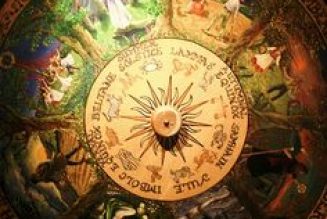
Many contemporary Wiccans and other Pagans find that rather than joining a group, they prefer practicing as a solitary. The reasons for this as are as varied as those who walk the path – some may find that they work better by themselves, while others who wish to join a coven may be limited by geography or family and job obligations.
COVENS VS. SOLITARIES
For some people, it’s hard to make the decision to practice as a solitary.
For others, it’s a no-brainer. Both methods have their benefits, and you can always change your mind if you find that one isn’t working for you. Some of the advantages of practising as a solitary Pagan include setting your own schedule, working at your own pace, and not having to deal with the dynamics of coven relationships. The downside, of course, is that you’re working alone, and at some point, you may find yourself wishing you had someone to tell you where to go and what to do next in order to expand your knowledge.
Regardless, there are a number of things to keep in mind if you’re considering – or have already found your way to – a path as a solitary Wiccan or Pagan. Here are five practical tips to help you on your way to successful solitary practice.
Try to establish a daily routine. It’s easy to let your studies go by the wayside if you’re all by yourself, so establishing a daily routine will help you keep on task. Whether your routine includes meditation, reading, ritual work, or whatever, try to do something each day that helps you work towards achieving your spiritual studies.
Write things down. Many people choose to keep a Book of Shadows, or BOS, to chronicle their magical studies. This is important for a variety of reasons. First, it allows you to document what you’ve tried and done, as well as what works and doesn’t work for you. Secondly, by writing down your rituals, prayers, or spellwork, you’re laying the foundation for your tradition. You can go back and repeat things that you find to be useful later one. Finally, it’s important to keep track of what you do magically and spiritually because as people, we evolve. The person you are now is not the same person you were ten years ago, and it’s healthy for us to be able to look back and see where we were, and how far we’ve come.
Get out and meet people. Just because you’ve chosen to practice as a solitary doesn’t mean you should never come into contact with other Pagans or Wiccans. Most metropolitan areas — and a lot of smaller communities — have informal Pagan groups that get together regularly. This offers solitaries a chance to network and chat with each other, without having to form specific organized groups. Take advantage online resources to see what’s in your area. If there’s nothing around you, consider starting a study group of your own for like-minded folks.
Ask questions. Let’s face it, we all need to start somewhere. If your read or hear something and you want to know more about it, ask. If something isn’t clear, or contradicts something you’ve already read, ask. Don’t accept everything at face value, and remember that just because one person had a particular experience doesn’t mean that you’ll have an identical experience. Also, keep in mind that just because you read something in a book doesn’t necessarily mean it’s valid — learn to ask whether a resource is worth using or not. Don’t be afraid to be a skeptic sometimes.
Don’t ever stop learning. Ask other people in the Pagan community — either online, or in real life — for recommendations about books and other resources. If you read a book that you enjoy, check the back for a bibliography and see what other books that author suggests. Remember that learning can take place by reading, but it can also develop from personal experience, and from speaking with other people involved in Paganism.
ECLECTIC PRACTICE
So now that you’ve read over those five basic tips, you’re probably wondering, “But how do I practice if I’m all by myself?” Well, if you’ve decided that practicing as a solitary Pagan is the right path for you, you may find you work best not with a structured system of belief and practice, but by developing things on your own. This is fine – many people create and enhance their own traditions, taking what they need from other, established traditions, and blending it together to create a brand new system of belief. Eclectic Wicca is an all-purpose term applied to NeoWiccan traditions that don’t fit into any specific definitive category. Many solitary Wiccans follow an eclectic path, but there are also covens that consider themselves eclectic. A coven or individual may use the term “eclectic” for a variety of reasons.
SELF DEDICATION
One of the benchmarks for many people involved in the Pagan community is the initiation ritual – it’s a ceremony that marks us as belonging to something, as being part of a community, a coven, or some fellowship that we have not known before. It’s also, in many cases, a time to formally declare ourselves to the gods of our traditions. By the very definition of the word, however, one cannot self-initiate, because “initiate” is something that must include two people. Many solitaries find instead that a self-dedication ritual fills that need perfectly – it’s a way of making a commitment to one’s spiritual growth, to the deities we honor, and to learning and finding our way.
NEVER STOP LEARNING
If you’re practicing as a solitary Pagan, it’s easy to fall into the trap of “I’ve read all my books.” Don’t ever stop learning – once you’ve read all your books, go find some new ones. Borrow them from the library, buy them (used if you prefer), or check them out online from reputable sources like Sacred Texts or Project Gutenberg. If there’s a particular subject you’re interested in, read about it. Keep expanding your knowledge base, and you’ll be able to continue and grow spiritually.
CELEBRATING WITH RITUAL
When it comes to celebrating rituals, the ceremonies on this site are typically designed so that they can be adapted either for a group celebration or a solitary ritual. Browse the listings for the various Sabbat rituals, find the rite you want to perform, and tweak it to meet your needs.
Once you feel comfortable with ritual practice, try writing your own!







